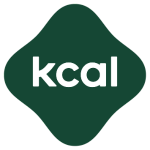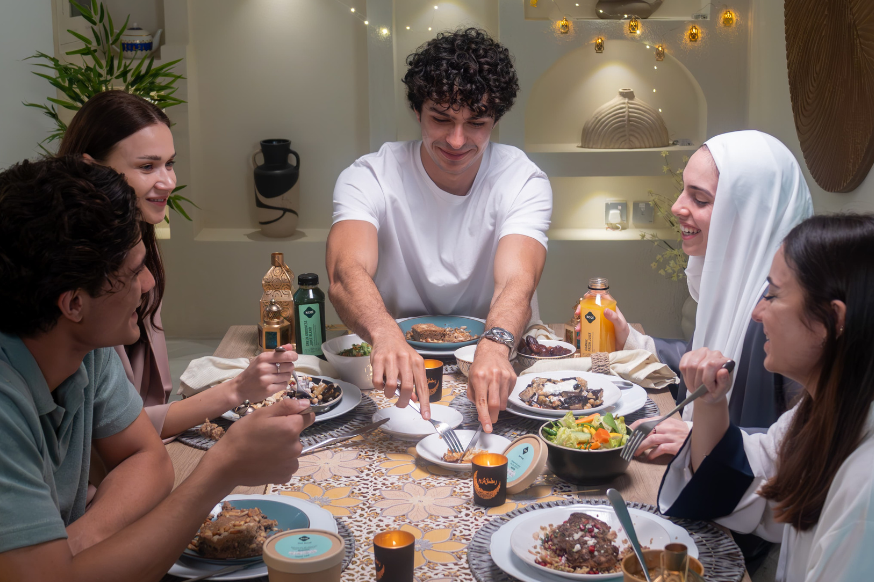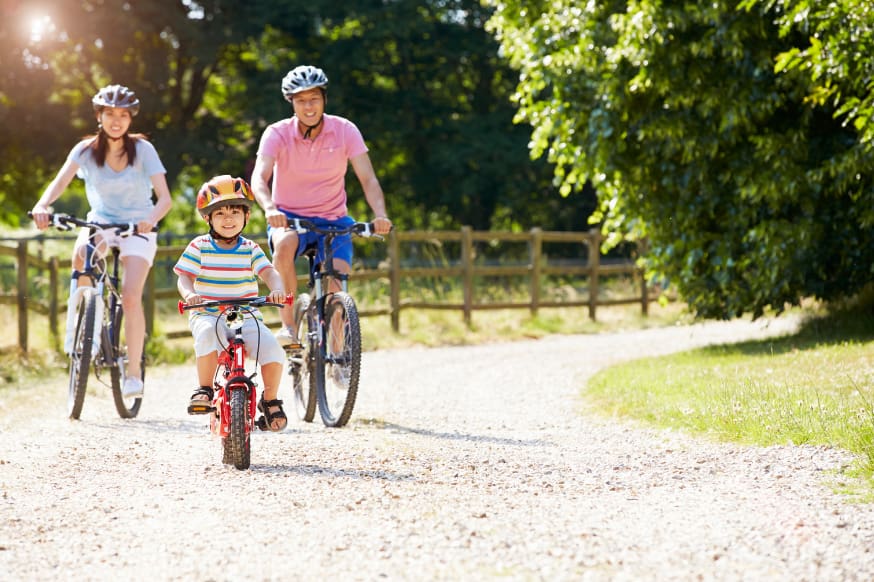Summer is often a time of relaxation, travel, and enjoying new food experiences. Whether you’re vacationing abroad or staying closer to home, eating out is a big part of the experience. However, while it’s tempting to indulge, it’s important to maintain balanced nutrition to ensure you feel your best, especially in the heat.
Opt for Lighter, Nutrient-Rich Foods
Hot weather can make heavier meals feel more uncomfortable and sluggish. Instead, focus on foods that provide nourishment without making you feel weighed down. Choose dishes that are grilled, baked, or steamed, as opposed to fried options. These cooking methods typically use less oil and fat.
When selecting foods, prioritize options that hydrate and replenish essential nutrients. Fruits and vegetables with high water content, such as watermelon, cucumbers, and tomatoes, help with hydration while providing important vitamins and minerals. Additionally, including a variety of colorful vegetables ensures you’re getting an array of antioxidants, which support the body’s response to oxidative stress caused by heat and sun exposure.
Focus on Balanced Meals
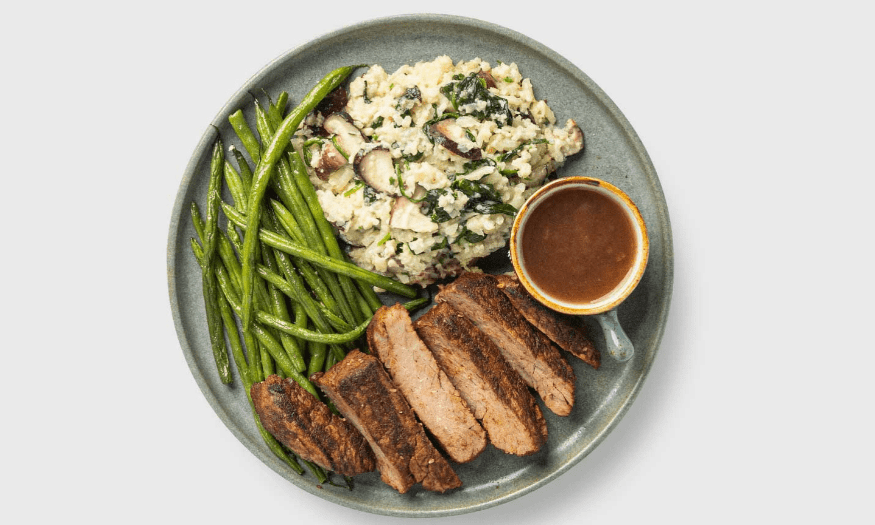
When planning meals, aim to include a variety of nutrient-rich foods. Prioritize:
Vegetables and fruits: High in vitamins, minerals, and water, they support hydration and overall health.
Proteins: Sources like fish, chicken, or legumes help with muscle repair and energy.
Whole grains or starchy vegetables: Foods like brown rice or sweet potatoes provide fiber and steady energy.
By combining these food groups in your meals, you’ll ensure a balance of essential nutrients without feeling overly full or sluggish.
If you’re not sure where to start, take inspiration from our list of nutrient-dense summer foods that keep you full longer.
Stay Hydrated and Balance Electrolytes
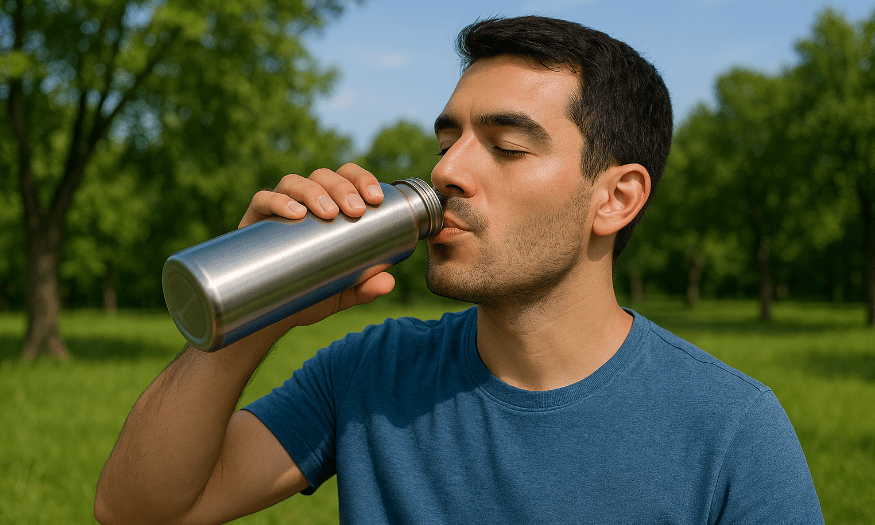
During hot weather, staying hydrated is crucial. However, it’s not just about drinking water; replenishing electrolytes is also vital. Electrolytes like potassium, magnesium, and sodium play a key role in maintaining fluid balance and proper muscle function.
Incorporate foods that are rich in electrolytes into your meals. Potassium can be found in bananas, sweet potatoes, spinach, and oranges. Magnesium is abundant in nuts, seeds, and dark leafy greens like kale and spinach. For an additional electrolyte boost, consider drinking coconut water, which contains both potassium and sodium and is a natural way to stay hydrated during the summer.
By focusing on both hydration and electrolyte balance, you’ll help prevent dehydration and fatigue, which are common in hot weather.
If you struggle with hydration, check out our blog on 6 simple ways to drink more water – it’s full of practical tips that actually work, even when you’re on the go.
Pack Nutrient-Dense Snacks
While traveling or spending long hours out, it’s easy to experience hunger before your next meal. Carrying nutrient-dense snacks can prevent you from resorting to unhealthy or overly processed options. Choose snacks that provide a balance of protein, fiber, and healthy fats to maintain steady energy.
Examples of smart snacks include:
- Trail mix (unsweetened, with nuts, seeds, and dried fruit)
- Greek yogurt with fresh fruit (high in protein and probiotics for digestive health)
- Whole-grain crackers with hummus (provides fiber and healthy fats)
- Fresh cut vegetables (like carrots, cucumber, or bell peppers) with a small portion of nuts or hummus
For more ideas, see healthy snack ideas for staying on track while traveling.
These snacks will help sustain energy levels, prevent overeating later in the day, and provide important nutrients.
Prioritize Breakfast
While it may seem like skipping breakfast is a way to reduce calorie intake, research consistently shows that skipping the first meal of the day can lead to blood sugar imbalances and overeating later. A balanced breakfast can help regulate metabolism and prevent excessive hunger.
A nutrient-dense breakfast that includes protein, fiber, and healthy fats can sustain your energy throughout the day. Consider these options:
- Overnight oats with chia seeds, berries, and almond butter (provides fiber, protein, and healthy fats)
- A smoothie made with spinach, banana, protein powder, and flaxseeds (provides hydration and keeps you full)
- Avocado toast with a boiled egg (a good balance of healthy fats and protein)
These meals will give you a steady release of energy and prevent the mid-morning slump that often comes from skipping breakfast.
For quick and nourishing options, take a look at our healthy breakfast ideas – they’re perfect for busy mornings, even while travelling.
Enjoy Local Cuisine Mindfully
Trying local food is an integral part of travel, but it’s important to enjoy it in moderation. Many cuisines feature rich, flavorful dishes, but they can often be high in fats and calories. Enjoy these meals but consider balancing them with lighter, more nutrient-dense options later.
Be mindful of portion sizes and try to focus on dishes that include fresh vegetables, lean proteins, and whole grains. Eating slowly and paying attention to your body’s signals will also help you avoid overeating. Local markets or restaurants may also offer fresh fruits, salads, or lighter preparations of traditional dishes.
Practice Balanced Eating & Mindful Portions
One heavy or indulgent meal won’t ruin your entire day or week. Studies show that keeping a balanced approach over time matters more than stressing over one meal. So, if you enjoy something richer, simply balance it with lighter, nutritious meals afterward. When eating at buffets or all-you-can-eat spots, it helps to pause before filling your plate and check in with your hunger. Eating slowly and starting with smaller portions can prevent overeating. You can always go back for more if you’re still hungry.
Stay Active

Staying active is essential for your physical health, digestion, and energy especially during the summer months, whether you’re on vacation or at home. It’s important not to let inactivity take over, as even light movement like walking, swimming, or stretching can make a big difference in maintaining your metabolism and boosting your mood.
If you’re traveling, make it a priority to explore new places on foot or take a refreshing swim to stay energized and hydrated. For those staying home, don’t underestimate the power of daily walks, gentle yoga, or simple stretching routines. Keeping your body moving is key to feeling your best all summer long.
Vitamin D: Maintain Optimal Levels
Vitamin D is essential for bone health, immune function, and energy regulation. However, many people, particularly those who have limited sun exposure, may suffer from vitamin D deficiency. In places like the UAE, where the sun is strong but direct exposure is often limited, dietary sources of vitamin D become crucial.
Good sources of vitamin D include fatty fish (like salmon and mackerel), fortified dairy products, and egg yolks. If you’re concerned about low vitamin D levels, a blood test and supplementation may be necessary. Consulting with a healthcare provider can help determine the best approach for maintaining adequate levels of vitamin D.
A Balanced Approach to Summer Eating
With a few thoughtful adjustments, you can enjoy your summer meals while still taking care of your health. Focus on balanced, nutrient-rich meals, stay hydrated, and incorporate foods that replenish vital electrolytes. Listen to your body’s needs, stay active, and remember that enjoying the foods you love doesn’t mean neglecting your well-being.
